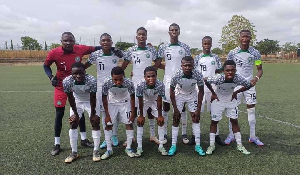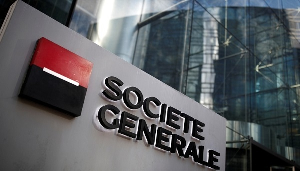- Home - News
- TWI News | TV
- Polls
- Year In Review
- News Archive
- Crime & Punishment
- Politics
- Regional
- Editorial
- Health
- Ghanaians Abroad
- Tabloid
- Africa
- Religion
- Election 2020
- Coronavirus
- News Videos | TV
- Photo Archives
- News Headlines
- Press Release
General News of Tuesday, 29 October 2002
Source: Ghana Palaver
Shocking revelations on "IFC" loan
The NPP government is in real trouble. This Thursday is the deadline for the delivery of the $350m “IFC” imaginary loan and so far, despite all the noise made by Hon J.H. Mensah & co., we have not heard of the transfer of a single dollar into the accounts of Ghana government from this loan.
Apparently, the silence from Hon Yaw Osafo-Maafo’s Ministry of Finance and Dr Paul Acquah’s Bank of Ghana on the whereabouts of the money has caused serious panic in government circles.
With the country now facing the real possibility that the Sovereign Guarantee has been discounted and the proceeds pocketed by the members of the so-called “IFC”, the apostles of “Causing Financial Loss” suddenly see themselves facing the danger of having caused the greatest financial loss ever in the history of this country.
According to one of these very angry targeted individuals, who for the purposes of this article, is referred to as “Deep Throat”, the whole saga began with an invitation from President J.A. Kufuor to Professor Eddie Ayensu to try and source external private funds for development projects in fulfilment of the NPP’s campaign promises.
Two weeks after Eddie Ayensu had returned to his base in the US, he telephoned the President and informed him that he had met some financiers who were willing to grant Ghana a loan of $1b on concessional terms that would not breach the International Monetary Fund’s (IMF) conditionalities.
Senior Minister J.H. Mensah, Finance Minister, Yaw Osafo-Maafo and Governor Dr Paul Acquah who were already in Washington D.C. on IMF business were instructed to link up with Prof Eddie Ayensu to discuss details of the loan agreement.
At the initial meeting, Horst Schneider of Chemac Inc. representing the IFC informed the Ghanaian delegation of the existence of a Trust set up in South Africa that provides such funds for development projects in Third World countries and from which he could assist Ghana to benefit.
He added that the Trust did not charge any fees apart from a two per cent annual interest because it benefited from tax breaks for giving out the loans on such soft terms for specified development projects in developing countries.
The Ghanaian team could not immediately provide a list of projects it wanted the financing for, and the meeting was adjourned for a week, to enable them put together a discussable list of projects.
At the second meeting, the government representatives presented a list of four roads estimated to cost $600m, an unspecified number of factories estimated to cost $200m and $200m was set aside for consultancies, travelling and transport and per diem allowances.
A seven-member Board was proposed to manage the projects, four of whom were to be Ghanaians, and promptly the four Ghanaians present nominated themselves as the government representatives on the Board.
Schneider was then asked whether it would be possible to raise a similar soft loan for the New Patriotic Party (NPP) for its own private projects. He explained that this was not possible but however added that the government could include a transaction fee as part of the loan agreement which would be channelled back to those who facilitate the loan arrangement and the party. After necessary consultations, this was agreed and set at 3.5 per cent.
Chemac Inc. then prepared the documents, signed them, and sent them to His Excellency President Kufuor who handed them over to J.H. Mensah who in turn gave them to Prof G.K.A. Ofosu-Amaa, of Lexicon Associates, an NPP legal guru, one-time Director of the former Special Branch, now BNI, under the PP government of Dr K.A. Busia and former Dean of the Faculty of Law, University of Ghana, Legon, for study and advice.
Prof Ofosu-Amaa’s view was that even though the terms appeared very reasonable, extreme caution should be exercised in pursuing such a venture and therefore recommended that due diligence should be carried out including a verification of the credit rating of both Chemac Inc. and “IFC”.
As soon as the party gurus heard of this “good news”, a struggle for the Chairman and membership of the Trust ensued and the Finance Minister and Senior Minister were dropped. They were replaced by Party Chairman Harona Esseku and former Private Sector Development Minister and now Minister without portfolio C.O. Nyanor.
The documents were then rushed through Cabinet and presented to Parliament for approval. They did not pass through the Ministry of Finance bureaucracy neither did they pass through the Attorney-General’s Department for any legal opinion to be given.
When the NDC advised and cautioned against it at its Press Conference, an NPP leadership crisis meeting was quickly organised to discuss the issues they had raised. At that meeting, it was pointed out that the NDC had been very patriotic in their caution and the concerns they had raised should be taken seriously.
The general consensus however, was that the NDC was aware of what was in it for the NPP and were both jealous and apprehensive of the commission of $35m the party was to receive, so they should be ignored and a three-line whip applied in Parliament to ensure that the agreement was approved.
“Deep Throat” concluded by adding, “we were all involved so if things go wrong, we should all be collectively responsible. There is therefore no need for some people to resort to planting articles in some hostile newspapers with the intention of distancing themselves from the transaction and leaving others as the fall guys.”
Ghana Palaver can only express its total disappointment that the whole government machinery could be so blinded by greed to enter into such an obviously fraudulent and dubious financial transaction despite all the advice and caution expressed by concerned and knowledgeable persons within the community.










